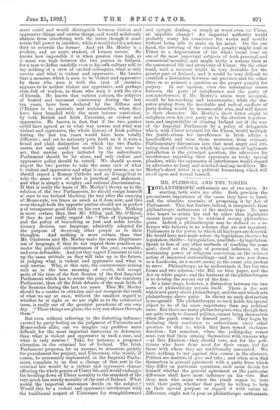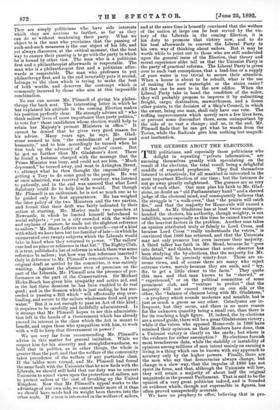MR. PLIMSOLL AND THE TORIES.
PHILANTHROPIC enthusiasts are of two sorts. At starting, both sorts are alike. Both proclaim the pre-eminent importance of the cause they have in hand, and the absolute necessity of promoting it by Act of Parliament. This last feature, indeed, is inseparable from philanthropic enthusiasm of the modern type. No man who hopes to attain his end by other than legislative means must expect to be reckoned among philanthro- pists. Indeed, a philanthropist may be defined as a re- former who believes in no reforms that are not statutory. Parliament is the power to which all his hopes are directed. He would have men made sober—by legislation, chaste—by legislation, thrifty—by legislation, unselfish—by legislation. Speak to him of any other methods of reaching the same goal ; dwell on the magic of personal influence, on the restraining power of religious conviction, on the indirect action of improved surroundings—and he sets you down as a Laodicean, as a secret enemy to the cause you profess to serve. Philanthropy, as he understands it, has but two forms and two colours,—the Bill on blue paper, and the Act on white paper ; and the business of the philanthropist is to develop the second out of the first.
At a later stage, however, a distinction between the two sorts of philanthropy reveals itself. There is the sort which sets party above philanthropy, and the sort which sets philanthropy above party. In theory no such destinction is recognised. The philanthropist as such holds his special object to be of far more importance than any political issue. But there are many philanthropists who, though they are quite ready to discard politics, cannot bring themselves when the pinch comes to discard party. They begin by declaring their resolution to subordinate every other question to that to which they have vowed exclusive devotion ; but somehow, when the polling-day comes near, you find them arming themselves with reasons why —at this Election—they should vote, not for the poli- ticians who have done most for their cause, but for those with whom they are traditionally associated. We have nothing to say against this course in the abstract. Politics are matters of give and take ; and when men find. themselves in general agreement with a party from which they differ on particular questions, each must decide for himself whether the general agreement or the particular difference shall have most influence on his vote. But then, men who mean when the pinch comes to vote with their party, whether that party be willing to help on their special purpose or regard it with entire in- difference, ought not to pose as philanthropic enthusiasts. They are simply politicians who have side interests which they are anxious to further, so far as they can do so without weakening their party. What we object to is the man who proclaims that the passing of such-and-such measures is the one object of his life, and yet always discovers, at the critical moment, that the best way to ensure their passing is to go with the party to which he is bound by other ties. The man who is a politician first and a philanthropist afterwards is respectable. The man who is a philanthropist first and a politician after- wards is respectable. The man who professes to put philanthropy first, and in the end invariably puts it second, belongs to the class which is trying to make the best of both worlds, and deserves the contempt which is commonly incurred by those who aim at this impossible combination.
No one can accuse Mr. Plimsoll of giving his philan- thropy the back seat. The interesting letter in which he has explained his attitude in the coming Election makes his position perfectly clear. He strongly advises all " who think sailors' lives of more importance than party politics," to vote for " those candidates whose election would help to retain her Majesty's present Ministers in office." It cannot be denied that he gives very good reason for his advice. Many years ago, he says, Mr. Glad- stone seemed to him " the embodiment of justice and humanity," and to him accordingly he turned when he first took up the advocacy of the sailors' cause. But be got no further than Mr. Gladstone's door. There he found a footman charged with the message that the Prime Minister was busy, and could not see him. "Much depressed," he turned away, and went to Arlington Street, to attempt what he then thought the impossibility of getting a Tory to do some good to the people. He was at once admitted, was received with courtesy, was listened to patiently, and in the end was assured that what Lord Salisbury could do to help him he would. But though Mr. Plimsoll is an enthusiast, he is not so much one as to be guided only by first appearances. He has weighed the later policy of the two Ministers and the two parties, and found that their drift was fairly indicated by their action at starting. Mr. Morley made two speeches at Newcastle, in which he limited himself beforehand to social subjects ; "yet in a city crowded with the widows and orphans of seamen, he made not the slightest reference to sailors." Mr. Shaw-Lefevre made a speech—one of a kind with which we have been but too familiar of late—in which he enumerated over twenty subjects which the Liberals would take in hand when they returned to power. " The sailors' case had no place or reference in that list." The Eighty Club, it is true, published a list of reforms in which there was some reference to sailors ; but how was that reference inserted ? Only in deference to Mr. Plimsoll's remonstrances. In the original draft as settled by the committee, it was entirely wanting. Against the absence even of promises on the part of the Liberals, Mr. Plimsoll sets the presence of per- formance on the part of the Conservatives. Sir Michael Hicks-Beach has given him sympathy and active aid, and in the last three Sessions he has been enabled to do real good ; and in the Session which is just ending, he has suc- ceeded in passing a Bill which " will effectually stop over- loading, and secure to the sailors wholesome food and pure water." But it is not enough to pass an Act of this kind ; it requires to be carefully and faithfully administered. Is it strange that Mr. Plimsoll hopes to see this administra- tion left in the hands of a Government which has already proved its interest in the class which the Act is meant to benefit, and urges those who sympathise with him, to work with a will to keep that Government in power ?
We are very far from recommending Mr. Plimsoll's advice in this matter for general imitation. While we respect him for his sincerity and straightforwardness, we hold that in politics, as in other things, the whole is greater than the part, and that the welfare of the community takes precedence of the welfare of any particular class. If the tables were turned, and Mr. Plimsoll had found the same fault with the Unionists that he now finds with the Liberals, we should still hold that our duty was to convert Unionists to sound views upon the protection of sailors, not to protect sailors at the cost of breaking up the United Kingdom. Now that Mr. Plimsoll's appeal works to the advantage of our own side, we cannot make more of it than we should have made had its weight been throivn into the other scale. If a man is interested in the welfare of sailors, and at the same time is honestly convinced that the welfare of the nation at large can be best served by the vic- tory of the Liberals in the coming Election, it is his duty to promote that victory now, and to do his best afterwards to convert the Liberal Party to his own way of thinking about sailors. But it may be worth while to point out to those who are still undecided upon the general issue of the Election, that theory and recent experience alike tell us that the Unionist Party is the party of practical reforms. The Liberal Party is given over to such vast conceptions, that a load-line or a supply of pure water is too trivial to secure their attention. When a house is about to be rebuilt, what is the use of making the roof watertight or the stairs easier ? All that can be seen to in the new edifice. When the Liberal Party take in hand the condition of the sailor, they will probably propose to improve it by submitting freight, cargo, destination, seaworthiness, and a dozen other points, to the decision of a Ship's Council, in which the owner, being one man, shall only have one vote. The trifling improvements which merely save a few lives here, or prevent some discomfort there, seem unimportant by the side of so vast a change ; and so, in the end, Mr. Plimsoll finds that he can get what he wants from the Tories, while the Radicals give him nothing but magnifi- cent inattention.



































 Previous page
Previous page